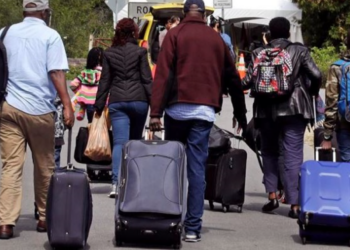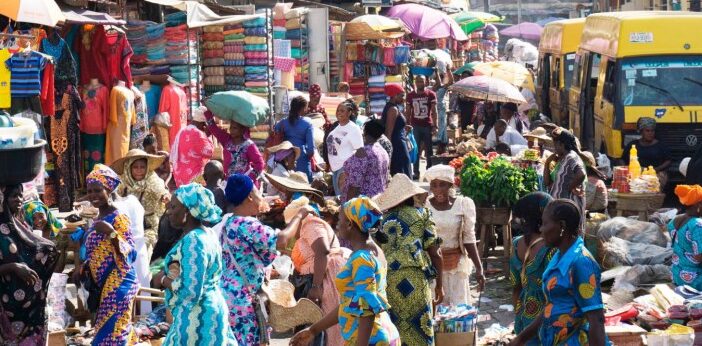When Akin arrived in the United Kingdom (UK) earlier this year, he was grateful to God for delivering him from Nigeria. Life had been tough for him back home, from his stressful job to long-commute hours due to traffic, landlord problems, epileptic power supply, and constant insecurity amongst other challenges.
A friend had convinced him to switch to the UK where his skills would be better compensated. However, what the friend did not tell him was that life is not all that sweet in the land of milk and honey. Things were about to get tougher.
Akin, a former supervisor in one of the major telcos in Nigeria, was full of great aspirations and positive vibes. The plan was for him to study for his master’s at the University of Keele, a public research institute in the United Kingdom. The degree, coupled with his professional experience, would enable him to earn more than he did in Nigeria. He also figured he’d be in a better position to send funds back home to his family, or so he thought.
Part of his lofty plan was to bring his long-time girlfriend to the UK after a while. Hopefully, she could find a job there, start schooling and then marry him. This is what the ultimate japa dream is made of!
Akin’s struggles: Unfortunately, securing a better life abroad is not as straightforward as he thought. In time, he realized that the UK, like most European countries, had a social ladder which everyone had to climb to achieve relative financial stability. It’s even worse if you are a foreign student from a poor country.
As he struggled to settle in, the other part of the struggle which his friend failed to inform him about started to unravel. The high cost of accommodation, limited working hours, and odd jobs soon led to Akin’s agitation.
Being an international student, he can only work about 20 hours a week, which means he could not get white collar jobs which he was accustomed to back in Lagos. He was left with the option of doing odd jobs.
He had declined a job offer from Vodafone just two weeks after he got into the UK due to his work-hour limitation.
To survive and keep up with the huge standard of living in the city of Newcastle, he had to work multiple jobs.
Shared experiences: Thousands of Nigerians looking for a better life in the UK face similar struggles as Akin. Chukwudi, who is doing his pre-master degree at Sheffield Hallam University in Sheffield, admitted that “life here in the UK has not been easy”.
Chukwudi’s experience could be likened to that of Akin, who spends almost all his earnings on accommodation and feeding. He told Nairametrics that he has been combining school and work, a very demanding and stressful reality to find one’s self.
- “I leave the house as early as 6 am and return most times by 10 pm, and spend my nights writing assessments, sometimes I have no choice but to contract some of the assignments out.
- “We are not able to get full-time employment, despite being qualified for the job due to the 20-hour-a-week limitation. We do caregiving jobs, dish-washing, office assistance, warehouse attendance amongst others.
- “I have had to decline many jobs offers in this country due to the 20 hours per week restriction for international students. Unfortunately, the 20 hours a week of work in actual term is not even enough to pay my school fees monthly,” Akin grieved.
Note that many foreign students who do odd jobs in the UK earn at best £1,800 per month. Interestingly, accommodation costs can take about £800 to £900 monthly or even higher, especially in big cities like London.
Accounting for taxes and school fees payments, which gulp almost £1,500 monthly, makes it nearly impossible for anyone to survive on their less than £2,000 monthly income.
Timothy’s Japa ordeal: Timothy, a Nigerian banker, gathered funds before the covid-19 in 2020 to send his wife and three kids to the United Kingdom so that his wife could complete her master’s and hopefully get a job and then pave the way for him to join them.
- But Timothy’s plan did not factor in the high cost of living in the UK, especially taking care of three kids. He planned to continue working in Nigeria as a banker and send funds to his wife for their accommodation, schooling, and upkeep.
- Timothy’s wife Sharon did get a job in the UK. Unfortunately, due to the work-hour limitation, she is only able to earn enough for their feeding and schooling, while Timothy covers accommodation and partly the children’s schooling as well.
- To meet this obligation amid high exchange rate costs, Timothy has had to move from his duplex to a self-contain and even sold his car.
- Timothy only gets to visit his family three times a year and misses them.
- “I do not get to see my children grow at a very important time of their lives, I miss them and feel very lonely in Nigeria,” he lamented.
- He believes it is the right sacrifice for a better future and hopes to join them when the wife finishes her studies and starts working. Meanwhile, Timothy will have to deal with the void of missing his family and living in a less conducive environment than he was used to.
Why they are leaving: The United Kingdom is a top choice for Nigerian immigrants hoping to benefit from the UK’s post-study work visa policy that allows international students to remain in the country for at least two years after graduation.
- The security that the United Kingdom offers, in addition to a better standard of living, functioning infrastructures like health, education and better academic standards are a few of the factors influencing the japa movement from Nigeria.
- In their defence, Nigeria has been bedevilled by many doldrums ranging from insecurity, high cost, social unrest, academic strike actions, unemployment and more. This has led to a massive exodus of Nigerians and their families to the UK.
- According to data from UK’s Home Office, Nigerians accounted for 40% of all dependants who accompanied foreign students in the 12 months to June 2022, despite Nigerian students making up just 7% of all foreign students during the period.
What the government is saying: Last week, Vice President Yemi Osinbajo urged Nigerian youths to resist the pressure to leave the country due to fear of the unknown. He urged Nigerians to be hopeful despite the economic challenges.
But this is not a piece of advice many Nigerian youths will be willing to consider, especially given the tough economic realities in the country.
How japa affects the Nigerian economy: The massive migration from Nigeria to other advanced economies has both positive and negative in the short and long-term to the Nigerian economy. We will consider how the massive human flight affects the largest African economy.
- Brain capital: On the positive side, the net migration towards countries in Europe, the USA, and Canada will benefit Nigeria in the long term in form of brain capital otherwise known as diaspora remittance.
- The World Bank had estimated that Nigeria’s remittance inflow will surpass the $20 billion threshold by the end of the year due to increased migration.
- Shortage of talent: In the short term, Nigeria is faced with a huge talent gap that will need to be filled, considering that the skilled workforce is the ones migrating, leaving a largely unskilled population.
- Exchange rate depreciation: The more Nigerians are looking to travel abroad, the high the demand for FX, which is hitherto a scarce resource in the Nigerian economy, leading to a depreciation in the value of the local currency.
- Improved Export value: Nigerians travelling abroad will demand Nigerian foods, clothing, and other apparel over there, which would shore up export earnings for the country.
- Family separation/psychological effect: Just like the case of Thomson, whose entire family is living in the UK, while he stays in Lagos faces psychological distress, not being able to watch his kids grow together with him. He misses very important stages in the lives of the children.
Better days ahead: Like Akin and Chukwudi, Oluwatobi, a second-year student at the University of Salford recounted his early days’ experience in the UK, which he explained were hard as well but was able to scale through.
- According to him, it took about two years for him to fully settle in before being able to send a substantial amount of funds home to families in Nigeria.
- “It is easier for new immigrants who have families in the UK and can accommodate them for a while, however, not very many people in the country are willing to have additional expenses in form of a family member living with them.”
- He concluded by adding that the beginning might be rough, but would get better along the line, with consistent effort, things will stabilise and in the end, it is worth the sacrifices.
























The times are hard everywhere.
Considering happening in the country Nigeria,no reasonable youth will want to stay in the country hence “japa” an euphemism for let’s go will always be craved for by virtually all Nigeria professionals.
You guys should speak for yourself. There are positive and negative turn out for different individuals. It’s better to flog it out with life abroad than in Nigeria whose leaders are only concerned about filling their overly filled stomach.
If not for my Japan plans, I wouldn’t have looked up this article. Thanks for letting me know what to prepare for.